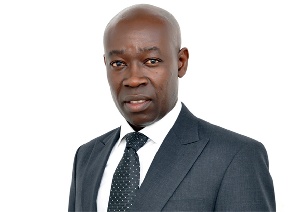- Home - News
- Elections 2024
- News Archive
- Crime & Punishment
- Politics
- Regional
- Editorial
- Health
- Ghanaians Abroad
- Tabloid
- Africa
- Religion
- Photo Archives
- Press Release
General News of Friday, 28 March 2025
Source: www.ghanawebbers.com
To Thine Own Self Be True –Let The Law Work
**Mr. Thaddeus Sory, a Legal Luminary**
On Tuesday evening, March 25, 2025, social media reported that the President of Ghana forwarded three petitions for the Chief Justice's removal to the Council of State. This action follows Article 146(6) of the 1992 Constitution. The article states that when removing the Chief Justice, the President must consult with the Council of State.
The President must appoint a committee consisting of two Supreme Court Justices and three other individuals who are not part of Parliament or lawyers.
Two days later, on Thursday, March 27, at 9:20 AM, Hon. Vincent Ekow Assafuah filed an action at the Supreme Court. He challenged the President’s referral of these petitions to the Council of State.
Mr. Assafuah claims that under several articles in the Constitution, including Articles 146 and 296, the President must notify the Chief Justice about her removal petition. He argues that she should provide comments before any consultation with the Council of State occurs.
This raises several questions:
- How did Mr. Assafuah know within one day that there was no consultation?
- Did the Chief Justice inform him directly?
- Was there any media report confirming this lack of consultation?
As his lawyer Godfred Dame suggests, things are becoming clearer. We either succeed together or fail together.
Only Article 146(6) is crucial in determining if consultation was necessary before referring to the Council of State. This article clearly states that for a removal petition concerning the Chief Justice, consultation with the Council is required.
In Agyei Twum v. Attorney General & Akwetey, Justice Date-Bah stated that a prima facie case must be established against the Chief Justice before forming an investigative committee. However, this case did not specify how to determine prima facie status.
What is clear is that consulting with the Council is mandatory for such petitions. Therefore, referring them complies strictly with constitutional requirements.
Several questions reveal flaws in Mr. Assafuah's suit:
- If it’s constitutional for referrals to occur as stated in Article 146(6), can it be deemed unconstitutional?
- Isn’t this referral a logical first step toward discussing prima facie determination?
- Shouldn’t consultations happen instead of unilateral decisions by the President?
Does referring these petitions imply a prima facie determination without hearing from the Chief Justice? Will this referral prevent her from commenting later?
In response to one petition from a former president, it appeared that prior consultations had occurred regarding whether there was a prima facie case against her. However, there was no indication in correspondence with Prof. Azar that she was consulted beforehand.
The Chief Justice believes firmly in legal processes and does not require presumptive protection; all Ghanaians share this belief in lawfulness.
The law mandates presidential consultation with the Council of State; this process is ongoing and should unfold naturally. The esteemed legal minds within the Council deserve trust as much as they have always asked us to trust them.
To Proxy Assafuah: I offer wisdom from Acts of Apostles chapter five. Peter and his fellow apostles faced intimidation but continued their mission without seeking legal recourse.
When arrested and brought before High Priest Gamaliel, he advised caution against silencing them based on past failures like Theudas and Judas—false prophets who ultimately failed.
Gamaliel wisely said: “If their work is human-made it will fail; if divine you cannot overthrow it.”
So let it be known: leave those petitioning alone! If their cause lacks merit it will fail; if just and true no court can stop them.
By Thaddeus Sory











